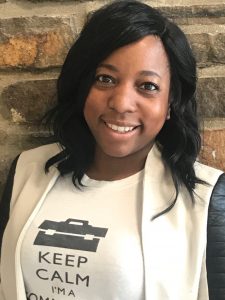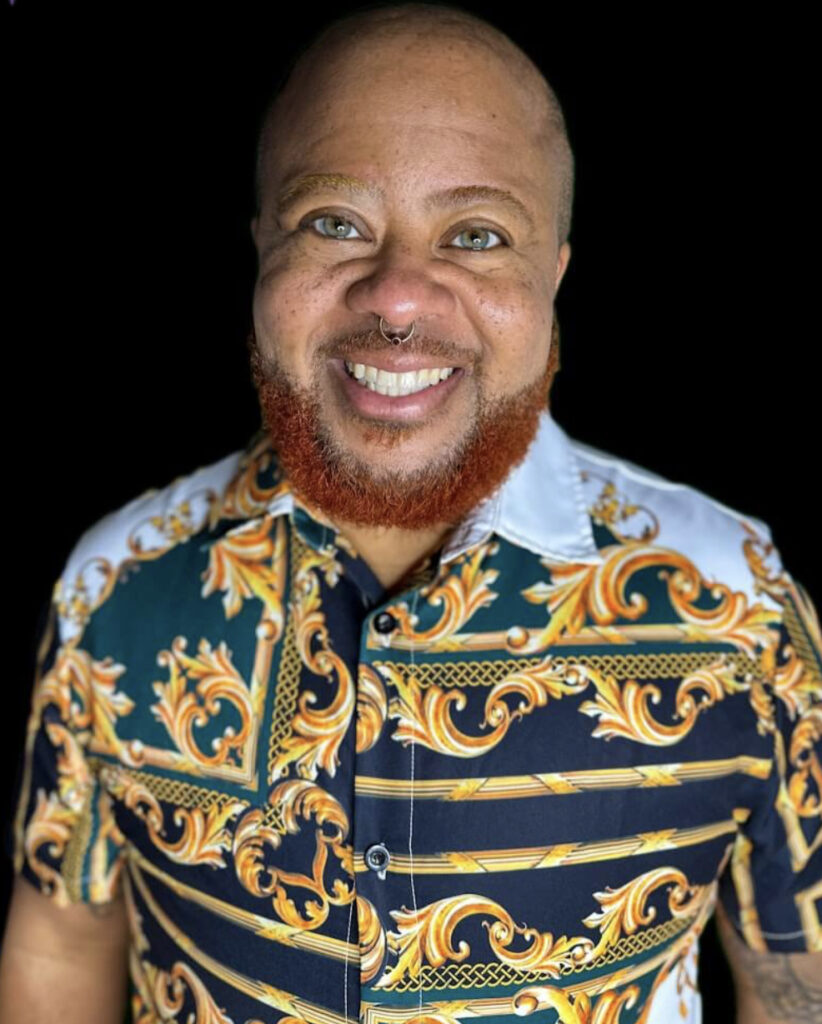Focusing on the Symptoms and the Root of Problems – Using Opportunities in Direct Practice Work to Inform a Career in Macro Practice – an interview with Oprah Keyes
Oprah Keyes, LMSW, is a Community School Coordinator at the University of Maryland-Baltimore’s School of Social Work, currently working in an elementary / middle school in West Baltimore. She is also a Clinical Instructor for MSW students engaged in field instruction. Additionally, Oprah works part time as a community based mental health therapist with children, transition aged youth, and adults in the Baltimore area. She graduated in 2014 from the UNC at Chapel Hill School of Social Work with a specialization in community, management and policy practice. Oprah met with Dr. Marie Weil, Professor Emeritus, this past summer to share her journey and experience as a macro social worker. Highlights from that conversation are shared below.
Journey to Social Work and Community Practice
Oprah shared that she is the daughter of an African-Americanfather and a Caribbean mother. While she grew up in the Netherlands, her father often talked about the U.S.Early in life, Oprah came to understand that people and communities of color suffered at the hands of racism, poverty, and other cumulative life disadvantages in the United States, as well as in the Netherlands, but particularly in the United States. This quest for improved equity led her to dream about becoming a lawyer specializing in family and youth court.
Oprah came to the states as a 17year-old and studied sociology at UNC Chapel Hill with a double minor in African and Afro-American Studies and Social-and-Economic Justice. Through the Campus Yshe had the opportunity to volunteer at the Durham County Youth Home every Saturday and facilitate psychoeducation groups with children. This experience helped her learn about the field of social work. As she got to know the children and youth she met there, she began to recognize themes in their life stories, causing her attention to shift towards addressing the policy and community issues that impacted the well-being of these young people.
During her senior year, Oprah worked as an Academic Coordinator for a small non-profit called Boomerang, funded by the YMCA at the time. This opportunity was made possible due to her APPLES Service Learning Course. After graduation, she stayed on as the Academic & Administrative Coordinator until her pursuit of her MSW. The program gave kids who were suspended from school for a few days an opportunity to build resiliency. The program was essentially a strength-based model that gave children coping tools for when they returned to the classroom. These experiences made her believe that community management and policy practice would be a good fit for her in her master’s level studies.
MSW Field and Classroom Learning
Oprah discussed that her learning in the classroom was connected to her learning in field. While she learned a lot from every class, she highlighted the value of classes like Program Development and Evaluation, Grant Writing, Motivational Interviewing, and Facilitative Leadership. She was creative when it came to advocating for field placements that aligned with her interests. In her first year, after drawing from her volunteer experiences at Durham County Youth Home, she requested a field placement as a juvenile justice court counselor. Oprah remembered learning from children and youth that their relationships with their court counselor really mattered to them and that court counselor advocacy was really important, so she wanted to make a difference in that role. Her second-year field placement was at Durham County Criminal Justice Resource Center. While there, she co-facilitated classes for people returning to community, wrote grant proposals, and developed programs. Oprah also sat on the board of the Juvenile Crime Prevention Council (JCPC).During that time, she landed a second internship working with Southern Coalition for Social Justiceon the Clean Slate Expungement Program.
Post Graduate Work
 After spending 2 years working in foster care in Virginia Beach, Virginia, Oprah felt that she should be working in an area where there was more need and the potential for a bigger impact. She was drawn to Baltimore, MD, which she now considers a great fit. Oprah insists that, “Baltimore chose me!” When she moved to the city, she became a school-based therapist at an alternative school for middle and high school students 16-21 years of age. The students taught her a lot about the many different hardships that students in this community endured. While satisfied with the impact she was making in her work as a school-based therapist, again, the pull of the larger social, environmental,and policy issues that effected the youth stirred up a feeling in her that led her to want to do more.
After spending 2 years working in foster care in Virginia Beach, Virginia, Oprah felt that she should be working in an area where there was more need and the potential for a bigger impact. She was drawn to Baltimore, MD, which she now considers a great fit. Oprah insists that, “Baltimore chose me!” When she moved to the city, she became a school-based therapist at an alternative school for middle and high school students 16-21 years of age. The students taught her a lot about the many different hardships that students in this community endured. While satisfied with the impact she was making in her work as a school-based therapist, again, the pull of the larger social, environmental,and policy issues that effected the youth stirred up a feeling in her that led her to want to do more.
Current Work
Her job as Community School Coordinator builds on her past experiences in both direct and macro practice with a new opportunity to create a vision for her work. As she highlighted, she took the job because, “I wanted to tackle things from a different point of view . . . I wanted to dosomething about those issues so kids don’t have to cope with the issue at all.”
In her current work, Oprah leverages strategic partnerships for the school. She explained that the community school model is based in the idea that the school is the hub of the community. She conducts needs assessments, builds asset maps, and investigates reasons why children and families aren’t as successful as they could be and/or would like to be. With that information she finds community partners, builds relationships with individuals, coalitions, and universities, and writes grants to bring valuable resources to the schools. Oprah explained that in her work, she wants to hear from the community themselves about what they need, because “I am not the expert, they are.” The community informs Oprah and her employer about what they need, and they do their best to make sure the community and students have access to the tools they need for success while also building capacity for the school community to have the agency to make their own changes.
Oprah has also been a therapist at a community-based organization foralmost 2 years and provides counseling services to children youth and adults aged from 8to 60 years. This give her an opportunity to work with clients on an individual level in ways that she may not always be able to in her role as a community school coordinator. Oprah engages in a wide range of work but explains “I love all of it…I like to be able to do both.”
Oprah has displayed vision and valor in finding roles that would allow her to do work for which she has a deep passion. Her steadfast curiosity in making systems and people better both as a student and throughout her career has allowed her to gain a wealth of knowledge and experience in just 4 years post MSW. We are honored to be a small part of Oprah’s journey. Her professional pathway underscores the value of listening to one’s heart and recognizing that there are many wonderful ways to practice social work.
